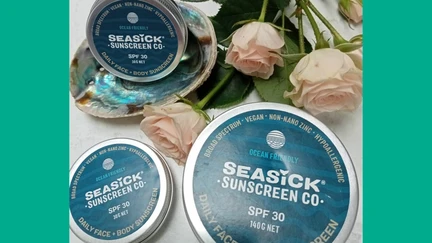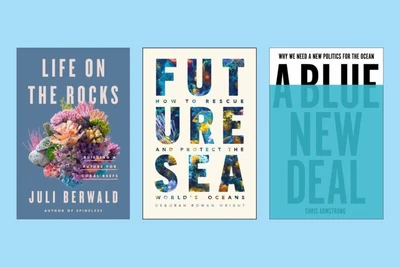Talking about oceans and wellbeing: Natalie Jones, Seasick Sunscreen Co.
Our Business Specialist librarian interviews Wellington businesses. Today we are happy to have Seasick Sunscreen Co.

The realisation that sunscreen chemicals and plastic bottles are contributing to ocean pollution hit Natalie Jones, founder of Seasick Sunscreen Co, some years ago when on a snorkelling trip in Hawaii.
As a long-time environmentalist/conservationist Natalie (Ngā Wairiki Ngāti Apa) was concerned to learn that the sunscreen she used on a daily basis could be damaging the coral reef and wildlife she was swimming with.
How then to have an effective sunscreen while limiting impact on the reef environment? For Natalie, the answer was to return home and begin researching how to make a better product.
The result is Seasick Sunscreen Co., a social enterprise on a mission to be Aotearoa’s most sustainable sunscreen brand. After much experimentation, trialling and tweaking Natalie created a sunscreen formula made with just seven naturally derived ingredients including non-nano zinc oxide.
As well as containing no animal products, Seasick Sunscreen Co has been independently certified as providing broad spectrum SPF30 protection.
As a social enterprise, two percent of Seasick Sunscreen Co's income is donated to ocean conservation projects such as Wellington’s Love Rimurimu Project, piloting the regeneration of kelp forests around Aotearoa's takutai (coastline).
Like all beginning businesses Natalie has faced challenges and is candid about how the journey from idea, to start up, to self-supporting sustainable business has not always been smooth.
Seasick Sunscreen Co began as a sidegig whilst Natalie worked a full-time job in conservation along with studying. She had to contend with learning the ins-and-outs of doing all the things a sole trader has to manage – product development, production, marketing, social media, sales and associated administration, as well as submitting product for the rigorous certification process.
Eventually Natalie reached a junction, needing to decide on growing the business or keeping it as a hobby business. She took the step of leaving her full-time employment and was accepted into Kōkiri, the business accelerator programme for Māori entrepreneurs. With encouragement from the course participants and her mentors Natalie then took the step of upscaling her business and outsourcing production.
However, the adrenaline buzz new businesses experience in the early days of setting up is, as Natalie found, not sustainable. For all businesses there comes a plateau point when an analytical eye needs to be cast over the future of the business. Natalie admits to reaching a crossroads after planned progress did not proceed as intended and resulted in a highly stressful situation. Natalie refers to this as her “long, dark night of the soul” and is something most, if not all, entrepreneurs can relate to!
The support received from the contacts she had made through Kōkiri, and the wider Wellington small business networks gave Natalie the perspective and strength to deal with the problems and continue growing her business.
"I defined what my success looks like and part of that is looking after my hauora and wellbeing. If I'm feeling healthy and balanced, for me, that's what my success looks like"
Ahead of the UN World Oceans Day on the 8th of June we sat down to have a kōrero with Natalie about the health of our oceans and looking after yourself as a sole trader business.
Want to know more about the importance of our marine environment and how you can take steps to care for it?
Check out some of these resources from Wellington City Libraries collections
Help for Kelp
This winter, baby giant kelp is being planted into Wellington Harbour / Te Whanganui-a-Tara, where great seaweed forests once thrived. North and South, June 2023 : P 16-17
Accessible through Libby Magazines
Where do young sea creatures spend their first weeks? What’s at the root of oceanic food chains? Kelp forests are to Aotearoa what coral reefs are to other marine ecosystems. Or they used to be.
Te taiao me te toitūtanga | Environment and sustainability resources

Life on the rocks : building a future for coral reefs / Berwald, Juli
Future sea : how to rescue and protect the world's oceans / Wright, Deborah Rowan
Blue new deal : why we need a new politics for the ocean / Armstrong, Chris
Saving the reef / Lloyd, Rohan
Your life, your planet : what you can do right now / Ebbs, Geoff
On the WCL movie streaming platforms Beamafilm and Kanopy (accessible with library registration and login) you will find the following documentaries of interest.
Half of all marine life has been lost in the last 40 years. By 2050 there will be more plastic in the sea than fish. The way the ocean operates is different to how we thought of it 100 years ago. We can no longer think of it as a place of limitless resources, a dumping ground, immune to change or decline. BLUE takes us on a provocative journey into the ocean realm, witnessing a critical moment in time when the marine world is on a precipice.
Revolution: The Fight to Save Our Oceans (2015)
In this multi-award-winning film, Rob Stewart embarks on a global journey to uncover the grave dangers threatening the world’s oceans -- and ultimately, humanity -- as well as to learn what it will take to reverse the challenges to life on earth.
From the coral reefs in Papua New Guinea to the rainforests of Madagascar, Stewart’s travels reveal that our fate is tied to even the smallest of creatures. Stunning scenes of underwater sea life bring viewers face to face with sharks and lemurs, into the microscopic world of the pygmy seahorse, and on the hunt with the deadly flamboyant cuttlefish.
The Urban Ocean: Human Impact on Marine Life (2018)
Our high-tech use of the ocean for food, transportation, and energy has far-reaching effects, particularly on certain species. Focusing on issues from noise pollution to microplastics, we can mitigate our impact to provide better futures for ourselves as well as for marine life. The work begins with understanding the extent of our true impacts.
For a business owner, particularly a sole operator, workloads can be high and burnout a reality.